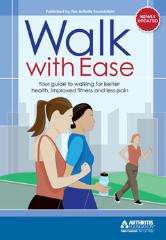Walking program reduces joint stiffness in older breast cancer survivors on aromatase inhibitor therapy

(Medical Xpress)—After six weeks of walking, the mean joint pain scores among the participants decreased by 10 percent, fatigue decreased by 19 percent, and joint stiffness decreased by 32 percent.
A self-directed walking program shows promise in easing joint stiffness in older women who experienced these symptoms while taking aromatase inhibitor therapy for breast cancer, according to new findings presented by University of North Carolina School of Medicine researchers this week at the American College of Rheumatology Annual Scientific Meeting in San Diego, Calif.
Osteoarthritis, or OA as it is commonly called, is the most common joint disease affecting middle-age and older people. It is characterized by progressive damage to the joint cartilage—the cushioning material at the end of long bones—and causes changes in the structures around the joint. These changes can include fluid accumulation, bony overgrowth, and loosening and weakness of muscles and tendons, all of which may limit movement and cause pain and swelling.
Knee osteoarthritis is a common form of osteoarthritis and is caused by cartilage breakdown in the knee joint. Factors that increase the risk of knee osteoarthritis—including being overweight, age, injury or stress to the joints, and family history—can increase the risk of knee osteoarthritis.
Postmenopausal female breast cancer patients whose adjuvant treatment generally includes an aromatase inhibitor, or AI, often experience joint pain or stiffness known as AI-associated arthralgia. An estimated 20 to 32 percent of these women stop taking their AI due to this side effect. Researchers at UNC conducted a pilot study to assess the potential positive effects of physical activity on joint pain and stiffness in these patients, as a potential alternative or adjunctive approach to arthralgia management that would enable them to continue their cancer therapy while living as pain-free as possible.
"We were interested in seeing if a physical activity program that is evidence-based for reducing joint pain, stiffness and fatigue in adults with arthritis might have similar benefits for women experiencing AI-associated arthralgia," said Kirsten A. Nyrop, PhD, principal investigator for the pilot study and a member of UNC's Thurston Arthritis Research Center. "We were particularly interested in testing the feasibility and benefits of this program among older breast cancer survivors, because cancer is a disease of aging and physical activity may pose a special challenge for this age group."
Nyrop and colleagues at UNC tested the Arthritis Foundation's Walk With Ease self-directed walking program, which they adapted for breast cancer patients. Twenty women participated in the study. All were age 65 and older, had Stage I-III breast cancer, were on AI therapy, and reported joint pain or stiffness. The women followed the walking program for six weeks.
At the end of six weeks, 100 percent of the study participants said they would recommend the program to other breast cancer survivors experiencing joint pain or stiffness. All the participants also reported that they learned how physical activity could lessen their joint pain and stiffness, and that the program taught them how to safely engage in physical activity. In addition, 90 percent thought the program motivated them to be more physically active, explained how to overcome physical and mental barriers to exercise, and reported were extremely confident that they would continue walking in the future. After six weeks of walking, the mean joint pain scores among the participants decreased by 10 percent, fatigue decreased by 19 percent, and joint stiffness decreased by 32 percent.
A moderate-intensity self-directed walking program is feasible for elderly breast cancer patients on AI therapy and increase their engagement in regular walking or similarly safe physical activity, the researchers concluded.
"Physical activity is recommended for breast cancer patients – as it is for all adults – for both physical and mental health reasons," Nyrop said. "It is important to offer breast cancer survivors physical activity options that are safe, enjoyable, easy to do at home and on their own, with the promise of joint symptom relief that will encourage them to remain physically active in the long run."














